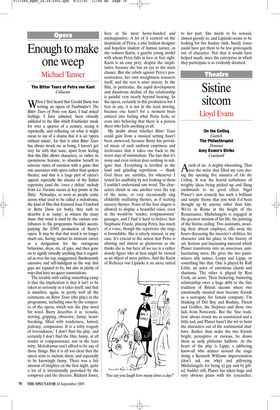Enough to make one weep
Michael Tanner
The Bitter Tears of Petra von Kant Coliseum When I first heard that Gerald Barry was writing an opera of Fassbinder’s The Bitter Tears of Petra von Kant, I had mixed feelings. I have admired, been virtually addicted to the film which Fassbinder made for over a quarter of a century, seeing it repeatedly, and reflecting on what it might mean to say of a drama that it is an ‘opera without music’, for that is what Bitter Tears has always struck me as being. I haven’t got very far with that issue, apart from feeling that this film allows characters, or rather its eponymous heroine, to abandon herself to extreme states of emotion with a gusto that one associates with opera rather than spoken theatre; and that is a large part of opera’s appeal, especially the classics of the Italian repertoire (and the ‘croce e delizia’ melody from La Traviata occurs at key points in the film). Nowadays, as soon as people come across what used to be called a melodrama, the kind of film that featured Joan Crawford or Bette Davis (or both), they rush to describe it as ‘camp’, as witness the many times that word is used by the various contributors to the programme booklet accompanying the ENO production of Barry’s opera. It may be that that word is no longer much use, having started its meteoric career as a designation for the outrageous behaviour, dress, etc. of gays, and then gone on to signify virtually anything that is regarded as over the top, exaggerated, flamboyantly excessive and self-indulgent in the way that gays are reputed to be, but also in plenty of ways that have no queer connotations.
The trouble with calling something camp is that the implication is that it isn’t to be taken as seriously as it takes itself; and that is manifest, again, in pretty well all the comments on Bitter Tears (the play) in the programme, including ones by the composer of the opera, which sets the play word for word. Barry describes it as ‘ecstatic, moving, gripping, obsessive, funny, heartbreaking, filled with tenderness, hatred, jealousy, compassion. It is a witty tragedy of lovesickness.’ I don’t find the play, and certainly I don’t find the film, funny, at all tender or compassionate, nor in the least witty. Melodramas can’t afford to be any of those things. But it is all too clear that the opera aims to include them, and especially to be knowingly funny. There was a fair amount of laughter on the first night, quite a lot of it intentionally provoked by the composer and the director, Richard Jones, here at his most heavy-handed and unimaginative. A lot of it centred on the ineptitude of Petra, a chic fashion designer and hopeless student of human nature, as she seduces Karin, a gauche young model with whom Petra falls in love at first sight. Karin is an easy prey, despite the ineptitudes, because she has an eye to the main chance. But she rebels against Petra’s possessiveness, her own straightness reasserts itself, and the rest is utter misery. In the film, in particular, the rapid development and disastrous decline of the relationship is painful very nearly beyond bearing. In the opera, certainly in this production but I fear in any, it is not in the least moving, because one hasn’t for a moment been enticed into feeling what Petra feels, or even into believing that there is a person there who feels anything at all.
My doubt about whether Bitter Tears could gain from a musical setting hasn’t been answered, because Barry has provided music of such uniform emptiness and irrelevance that it takes one back to the worst days of minimalism. The fact that it’s noisy and even violent does nothing to mitigate that. Everything is levelled in the loud and grinding repetitions — thank God there are surtitles, for whenever I tested for audibility by not looking at them I couldn’t understand one word. The characters shriek at one another over the top of the noise, or very occasionally sing childishly oscillating themes, as if reciting nursery rhymes. None of the four singers is allowed to display a beautiful voice, even in the would-be ‘tender, compassionate’ passages, and I find it hard to believe that Stephanie Friede, playing Petra, has much of a voice, though the repertoire she sings is formidable. She is utterly miscast, in any case. It’s crucial to the action that Petra is alluring and almost as glamorous as she thinks she is, but here all we see is a rather dowdy figure who at best might be viewed as an object of mere pathos. And the Karin of Rebecca von Lipinski is no more suited to her part. She needs to be sensual, almost grossly so, and Lipinski seems to be looking for her hockey stick. Surely Jones could have got them to be less grotesquely out of character. Not that it would have helped much, since the enterprise in which they participate is so evidently doomed.
































































 Previous page
Previous page